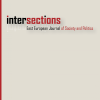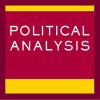Mid-term strategic plan of the Institute for Political Science (summary)
Leading the way in domestic political science: the Institute for Political Science has achieved outstanding publication performance in international journals between 2019 and 2022
Latest news

Márton Bene and Gabriella Szabó’s article entitled “Discovered and Undiscovered Fields of Digital Politics: Mapping Online Political Communication and Online News Media Literature in Hungary’ has been published in Intersections.
We are happy to present the winners of the Publication Scholarship Prize 2021: Ágnes Virág (Eszterházy Károly University) with the manuscript ‘Emotional Parliamentary Lions: Evaluative Metonymy Complexes in Editorial Cartoons” (supervisor: Márton Bene) and Szabolcs Hadászi (Corvinus University) on the topic ‘The relationship between voting and trust in Hungary’ (supervisor: Zsolt Boda).

In democratic political systems, the main actors of representative democracy are party leaders, elected parliamentarians, and cabinet members. In addition to these, there are other ways of decision-making in a democratic political system such as participatory and deliberative democracy. These involve citizens and non-governmental organizations that aim to improve the social acceptance and effectiveness of political decisions. Research on democratic innovations focuses on successful practices and methods aimed at changing democratic governance and political structures to improve them. Such innovations range from direct democracy (e.g. referendums, agenda initiatives, recall) to deliberative practices (e.g. deliberative polling, consultative mini-publics, participatory budgeting etc.) in offline and online settings.

POLTEXT’s proposal for ParlaMint’s ‘Call for New Languages’ has been successful and POLTEXT will now have the opportunity to contribute parliamentary corpora to ParlaMint’s (CLARIN) collection.

Miklós Sebők and Zoltán Kacsuk have published an article entitled ’The Multiclass Classification of Newspaper Articles with Machine Learning: The Hybrid Binary Snowball Approach’ in Political Analysis.

Publication: Miklós Sebők and Sándor Kozák have published a new article entitled ‘From State Capture to “Pariah” Status? The Preference Attainment of the Hungarian Banking Association (2006–14)’ in Business and Politics.
Latest posts

In the fifth pti memo blog post, we report on a lecture by Boglárka Koller, in which she presented her project titled "Cultivating Our European Resilience and Evolution" (CORE) and its significance. Boglárka Koller is the Head of the Department of European Studies at the University of Public Service, Senior Research Fellow at the Centre for Economic and Regional Studies (KRTK), and Jean Monnet Chair. The lecture was hosted by the HUN-REN CSS Institute for Political Science on May 22, 2025, as part of its Speaker Series.

The latest post of the pti memo blog series offers insights from a thought-provoking lecture by Murat Somer, Professor of Political Science and International Relations at Özyeğin University Istanbul and Research Affiliate at the Democracy Institute of the Central European University. Titled "Quo Vadis in Turkey and Implications for Democracy in the World", the lecture explored current political developments in Turkey and their broader implications on combating democratic backsliding. The event took place on May 8, 2025, as part of the HUN-REN CSS Institute for Political Science’s Speaker Series.

The third blog post of the pti memo series summarises the lecture of Dr. Matthew Edward Bergman, Assistant Professor at Corvinus University of Budapest, titled “Ideological Conflict, Logrolling, and Policy Reform: An Analysis of Government Declarations in Western Europe.” The event was organised as part of the HUN-REN Institute for Political Science’s Speaker Series on April 10, 2025. This research, conducted jointly with Hanna Bäck (Lund University) and Wolfgang C. Müller (Universität Wien), investigates why some governments commit to more reform measures in their government declarations.

The second pti memo post summarises the lecture by Bálint Magyar and Bálint Madlovics, researchers at the CEU Democracy Institute, titled “The Russia-Ukraine War and Its Structural Consequences.” The event was organised as part of the HUN-REN Institute for Political Science’s Speaker Series on February 6, 2025.
Hungary is often portrayed as a problem case for European integration due to frequent clashes between Viktor Orbán’s government and the EU’s institutions. Yet, as András Bíró-Nagy and Gergő Medve-Bálint explain in their post on the LSE EUROPP blog, the country’s 20 years in the EU have also seen a relatively high level of compliance with EU policies and strong support for membership among the public.
.png&w=100&h=100&zc=1)
In the first pti memo post, we summarise Christian Baden’s (Hebrew University of Jerusalem) thought-provoking lecture titled “Propaganda as a Social Process.” The lecture was hosted by the HUN-REN Institute for Political Science as part of its Speaker Series event series on January 23, 2025.











.jpg&w=100&h=100&zc=1)








.png&w=100&h=100&zc=1)